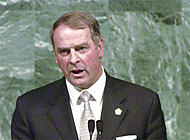Switzerland seeks greater ties with United Nations

The Swiss president, Adolf Ogi, has told world leaders at the Millennium summit in New York that Switzerland is seeking to increase its involvement in the United Nations.
In the first address by a Swiss president to the United Nations general assembly, Ogi said on Thursday that while Switzerland still only had observer status at the UN, its people would vote in two years’ time on full membership.
He reminded leaders attending the summit of Switzerland’s commitment and links to the UN.
Ogi recalled that Geneva is the European headquarters of the UN, and that Switzerland is both a member of most UN agencies and contributes heavily to the UN budget.
He said Switzerland also shared the UN’s values of peace, democracy, and the respect of human rights.
One of the Swiss government’s main foreign policy goals is full membership of the UN. The issue will be put to a popular vote in 2002. The Swiss people rejected membership when it last came to the vote in 1986.
Turning to international issues, Ogi stressed Switzerland’s commitment to help resolve world problems, and said international laws were not enough to safeguard human rights.
He highlighed the example of war which, he said, had changed in its nature over the last century. Fighting within nations had overtaken wars between nations. Ogi said conflict was now frequently localised, inter-ethnic, or the work of terrorists.
Ogi said he hoped that the Truth and Reconciliation Commission in South Africa would serve as an example for healing past injustices.
Much of the other debate at the summit has focussed on efforts to ease poverty and promote peace.
World leaders have been discussing the Millennium report of the UN secretary general, Kofi Annan. His strategy is to work more closely with private business to reduce poverty and conflict, and protect the environment.
swissinfo with agencies

In compliance with the JTI standards
More: SWI swissinfo.ch certified by the Journalism Trust Initiative









You can find an overview of ongoing debates with our journalists here . Please join us!
If you want to start a conversation about a topic raised in this article or want to report factual errors, email us at english@swissinfo.ch.